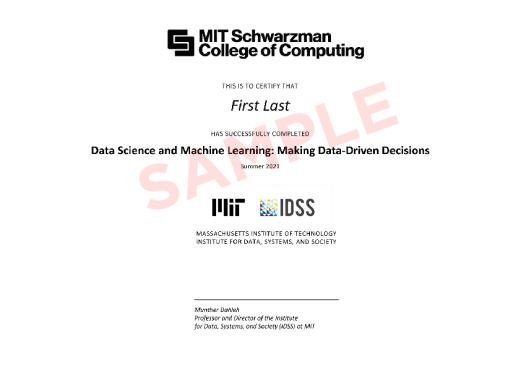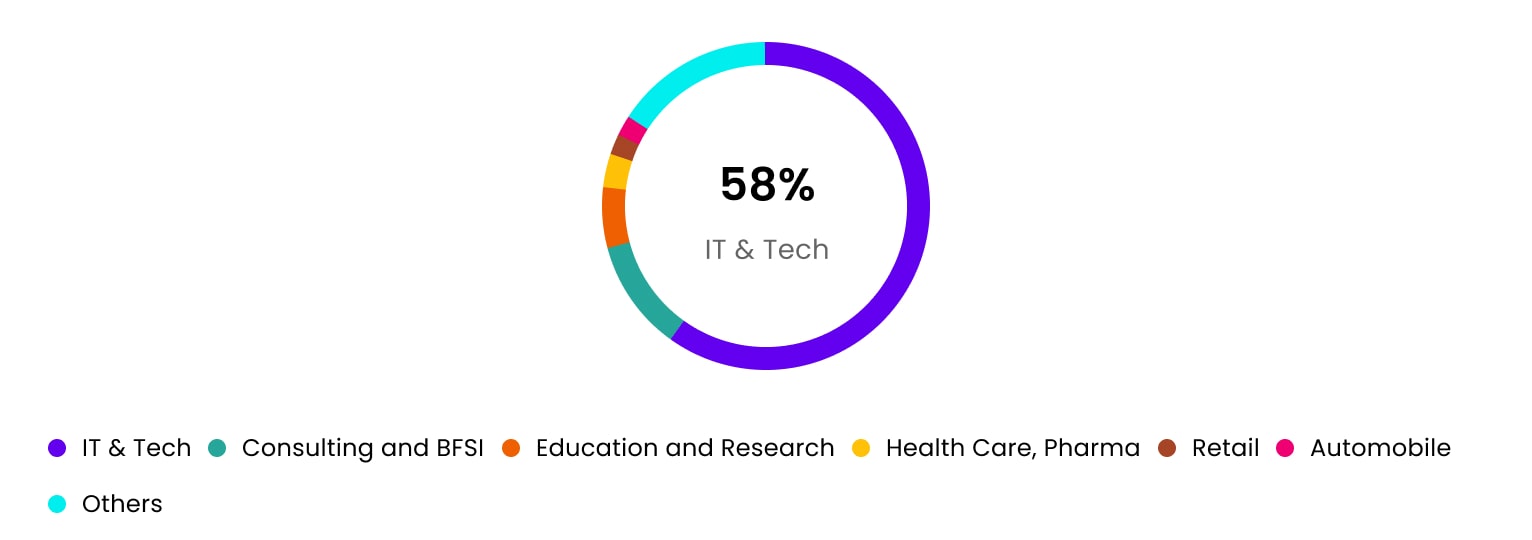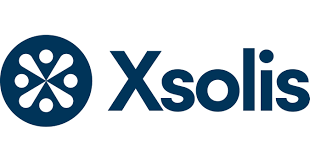Learn more about the course
Get details on syllabus, projects, tools, and more

Data Science and Machine Learning: Making Data-Driven Decisions
Build industry-valued AI, Data Science, and Machine Learning skills
Application closes 14th Aug 2025
Upskill in AI, Data Science & ML
-

Live Mentorship from Industry Practitioners
Join weekend live virtual sessions with AI, data science and machine learning professionals. Benefit from real-time guidance from experienced practitioners at global organizations.
-

Modules on Responsible AI and Generative AI
Deepen understanding of ethical AI with the Responsible AI module and explore innovations in Generative AI, covering tools, techniques, and real-world applications.
Program Outcomes
Key takeaways for career success in AI, Data Science, and Machine Learning
Designed for learners to gain hands-on experience and build industry-valued skills
Earn a certificate of completion from MIT IDSS
Key program highlights
Why choose the Data Science and Machine Learning program
-

Learn from MIT faculty
Learn from the vast knowledge of MIT AI, Data Science and Machine Learning faculty through recorded sessions.
-

Collaborative peer networking
Engage in a collaborative environment, networking with global AI, Data Science, and Machine Learning peers.
-

Build your AI, Data Science, and Machine Learning Portfolio
Showcase your AI and data science skills with 3 real-world projects and 50+ hands-on case studies in your e-portfolio.
-

Personalized mentorship sessions
Benefit from personalized weekend mentorship by experienced AI, Data Science and ML practitioners from leading global organizations.
-

Dedicated Program support
Connect with dedicated program managers to assist with queries and guide you throughout the course.
-

Generative AI Masterclasses
Get access to 3 masterclasses on Generative AI and its use cases by industry experts.
Skills you will learn
Python
Machine Learning
Deep Learning
Recommendation Systems
Computer Vision
Predictive Analytics
Generative AI
Prompt Engineering
Retrieval-Augmented Generation
Ethical AI
Python
Machine Learning
Deep Learning
Recommendation Systems
Computer Vision
Predictive Analytics
Generative AI
Prompt Engineering
Retrieval-Augmented Generation
Ethical AI
view more
- Overview
- Curriculum
- Projects
- Tools
- Certificate
- Faculty
- Mentors
- Reviews
- Fees
- FAQ

This program is ideal for
Professionals ready to advance their skills in AI, Data Science, and Machine Learning
View Batch Profile
-
Building Expertise for AI-driven Roles
Professionals looking to build expertise in AI, Data Science, and Machine Learning through hands-on projects and real-world applications.
-
Driving Actionable Insights
Individuals seeking to enhance their ability to turn complex data into actionable insights for better business decision-making.
-
Leading AI Initiatives
Professionals aiming to lead or contribute to AI and Data Science initiatives across industries.
-
Solving Business Challenges
Professionals interested in applying advanced AI techniques like Generative AI, Deep Learning, and Recommendation Systems to solve business challenges.
Syllabus designed for professionals
Designed by MIT faculty, the curriculum for the MIT Professional Education Applied AI and Data Science Program (formerly known as the Applied Data Science Program: Leveraging AI for Effective Decision-Making) equips you with the skills, knowledge, and confidence to excel in the industry. It covers key technologies, including artificial intelligence, machine learning, deep learning, recommendation systems, ChatGPT, applied data science with Python, generative AI, and more. The curriculum ensures you are well-prepared to contribute to artificial intelligence and data science initiatives in any organization.
Pre-Work: Introduction to Data Science and AI
This module is designed to help you get the most out of the program. We begin an introduction to foundational topics in Python programming, statistics, the Data Science lifecycle, and the evolution of AI and Generative AI. This module is designed to prepare all learners, regardless of prior experience, to confidently engage with the comprehensive curriculum ahead.
- Introduction to the World of Data
- Introduction to Python
- Introduction to Generative AI
- Applications of Data Science and AI
- Data Science Lifecycle
- Mathematics and Statistics behind DS and AI
- History of DS and AI
Weeks 1-2: Foundations – Python and Statistics
In this module, you will build essential programming and statistical skills. Learn to manipulate, visualize, and analyze datasets using:
- NumPy arrays and Functions
- Pandas Series and DataFrames
- Pandas Functions
- Saving and loading datasets using Pandas
- Data Visualization using Seaborn, Matplotlib, and Plotly
- Introduction to Inferential Statistics
- Fundamentals of Probability Distributions
- The Central Limit Theorem
- Hypothesis Testing
- Univariate Analysis
- Bivariate Analysis
- Missing Value Treatment
- Outlier Treatment
Week 3: Data Analysis and Visualization
In this module, you will learn unsupervised learning and dimensionality reduction techniques for pattern discovery.
- Understanding Classification and Clustering Methods
- Supervised Learning
- K-Means Clustering
- Dimensionality Reduction Techniques: PCA and t-SNE
Week 4: Machine Learning
In this module, you will build foundational machine learning models and understand their evaluation.
- Introduction to Supervised Learning
- Linear and Non-Linear Regression
- Causal Inference
- Regression with High-Dimensional Data
- Regularization Techniques
- Model Evaluation
- Cross-Validation
- Bootstrapping
Week 5: Revision Break
A dedicated break week to consolidate learning and catch up on pending coursework.
Week 6: Practical Data Science
In this module, you will apply real-world techniques in classification, ensemble learning, and forecasting.
- Introduction to Classification
- Logistic Regression
- Decision Trees
- Random Forest
- Type 1 Error & Type 2 Error in Classification Problems
- Hypothesis Testing
Week 7: Deep Learning
In this module, you will explore neural networks and their applications in computer vision and language processing.
- Introduction to Deep Learning
- Neural Network Representations (One Hidden Layer, Hidden Neurons, Multi-class Predictions)
- Introduction to Computer Vision (ANN vs CNN, Basic Terminologies, CNN Architecture)
- Transfer Learning
- Hypothesis Testing
Week 8: Recommendation Systems
In this module, you will design intelligent systems for personalization using a variety of recommendation techniques.
- Introduction to the Recommendations
- Content-Based Recommendation Systems
- Collaborative Filtering & Singular Value Thresholding
- Matrix Estimation Meets Content-Based
- Matrix Estimation Over Time
Week 9: Project Week
In this module, you will work independently on a hands-on project that allows you to apply program concepts to a domain of your choice.
Week 10: Generative AI Foundations
In this module, you will understand the architecture, evolution, and foundations of Generative AI.
- Origins of Generating New Data
- Generative AI as a Matrix Estimation Problem
- LLM as a Probabilistic Model for Sequence Completion
- Prompt Engineering
Week 11: Business Applications of Generative AI
In this module, you will learn how Generative AI and Agentic AI can drive business transformation.
- Natural Language Tasks with Generative AI
- Summarization, Classification and Generation
- Retrieval Augmented Generation (RAG)
- Agentic AI
Weeks 12–14: Capstone Project
For your Capstone Project, you will solve a real-world business challenge using techniques from across the program. Projects are guided and evaluated by mentors and reviewed by industry experts.
Projects and Case Studies
The program follows a learn-by-doing pedagogy, helping you build your skills through real-world case studies and hands-on practice. Below are samples of potential project topics and case studies you will work on.
-
3
hands-on projects
-
50+
case studies
Languages and Tools covered
-

Python
-

NumPy
-

Keras
-

Tensorflow
-

Matplotlib
-

Skitlearn
Earn a certificate of completion from MIT IDSS
Certificate from the MIT Schwarzman College of Computing and IDSS upon successful completion of the program
-

World #1
MIT ranks #1 in World Universities – QS World University Rankings, 2025
-

U.S. #2
MIT ranks #2 among National Universities – U.S. News & World Report Rankings, 2024–2025

* Image for illustration only. Certificate subject to change.
Program Faculty
Program Mentors
Interact with dedicated and experienced industry experts who will guide you in your learning and career journey
Course fees
The course fee is 2,500 USD
Invest in your career
-

Learn from world-renowned MIT IDSS faculty and top industry leaders
-

Build an impressive portfolio with 3 projects and 50+ case studies
-

Get personalized assistance with a dedicated Program Manager from Great Learning
-

Earn a certificate of completion from MIT IDSS and 8.0 Continuing Education Units (CEUs)
Third Party Credit Facilitators
Check out different payment options with third party credit facility providers
*Subject to third party credit facility provider approval based on applicable regions & eligibility
Application Process
-

1. Fill application form
Apply by filling a simple online application form.
-

2. Application Screening
A panel from Great Learning will review your application to determing your fit for the program.
-

3. Join program
After a final review, you will receive an offer for a seat in the upcoming cohort of the program.
Batch start date
-
Online · To be announced
Admissions Open
Frequently asked questions
What is the Data Science and Machine Learning course from the MIT Institute for Data, Systems, and Society (IDSS)?
The Data Science and Machine Learning course from MIT IDSS is designed in a modular structure with a comprehensive curriculum covering foundational and advanced concepts, which enables learners to master in-demand Data Science and Machine Learning skills to make data-driven decisions effectively.
Why should I choose this MIT Data Science and Machine Learning course?
At MIT IDSS, outstanding research is conducted with the objective of understanding and analyzing data to recommend solutions to complex societal problems. Consequently, the institute is dedicated to creating analytical techniques, including Statistics, Data Science, Machine Learning, etc., that may be employed in diverse areas like finance, health, urbanization, energy systems, and social networks.
MIT IDSS recognizes the power of uncovering the actual value of data and has created this Machine Learning and Data Science course for working professionals to advance their data analytical skills. Whether you are looking to enter into the sector, hunting for career development opportunities, or just looking to provide valuable insights to your business, the skills you develop in this course will make you familiar with harnessing the power of data in new and innovative ways.
What is the ranking of the Massachusetts Institute of Technology (MIT)?
According to the QS World University Rankings 2025, the Massachusetts Institute of Technology (MIT) is ranked #1 globally. The university is also ranked #2 in Best Global Universities in the U.S. News & World Report 2025-2026.
What languages and tools will I learn in this course?
Learners will master the most in-demand languages and tools during this course, including Python, NumPy, Keras, TensorFlow, Matplotlib, Scikit-Learn, and others.
Is it mandatory to bring my own laptop?
The learners are required to bring their own laptops. But the necessary technology requirement shall be shared during registration.
What is the duration of this MIT Data Science and Machine Learning professional certificate course?
The duration of this course is 12 weeks, and the course contains recorded lectures from award-winning MIT faculty, 50+ real-world case studies, and 3 industry-relevant hands-on projects.
Will I receive alumni status from MIT after completing my course?
Yes, learners will receive alumni status from MIT IDSS after completing their course. The benefits offered by MIT IDSS Alumni include:
-
Exclusive discounts on present and future courses offered by MIT IDSS
-
Subscription to MIT IDSS alumni mailing and newsletter lists
-
Advance notice on upcoming events and courses
What certificate will I receive after completing the MIT Data Science and Machine Learning course for working professionals?
Upon successfully completing this course, learners will secure a professional certificate, “Data Science and Machine Learning: Making Data-Driven Decisions”, from MIT IDSS.
Is the course completely virtual?
Yes, the course has been designed keeping in mind the needs of working professionals. Thus, you can learn the practical applications of Data Science and Machine Learning from the convenience of your home within an efficient 12-week duration.
Who will teach this MIT Machine Learning and Data Science course for working professionals?
This course is taught by MIT faculty members who have several years of experience and are highly recommended. In addition to teaching faculty, the course also includes highly skilled industry mentors who guide you to work on hands-on projects via live and personalized mentoring sessions.
What is unique about the curriculum of this MIT Machine Learning and Data Science course?
The curriculum of this course is designed by considering the following aspects:
-
Renowned MIT faculty members carefully crafted the curriculum to teach learners industry-relevant Data Science techniques and apply them to real-world problems.
-
The curriculum of this course covers essential Machine Learning techniques to deal with complex problems and make data-driven decisions.
-
Learners will also explore critical concepts of Deep Learning and Neural Networks and the process of applying them to areas like Natural Language Processing (NLP) and Computer Vision (CV).
-
The curriculum also teaches learners the theory behind Recommendation Systems and their application to diverse sectors.
What is the ranking of the Massachusetts Institute of Technology (MIT)?
MIT is ranked #1 university worldwide by QS World University Rankings 2023 and ranked #2 in national universities in the U.S. News & World Report 2023.
What is the required weekly time commitment?
Each week involves 2 hours of recorded lectures and an additional 2 hours hands-on session each weekend for 7 weekends, which include hands-on practical applications and problem-solving. Additionally, based on your background, you should expect to invest between 2 to 4 hours every week to self-study and practice. So, that amounts to a time commitment of 8-12 hours per week.
Will I receive a transcript or grade sheet after completion of the program?
No, Data Science and Machine Learning: Making Data-Driven Decisions is an online professional certificate program offered by MIT IDSS (Institute for Data, Systems, and Society) in collaboration with Great Learning. Since it is not a degree/full-time program offered by the university, therefore, there are no grade sheets or transcripts for this program by the university.
You will receive marks on each assessment to test your understanding and marks on each module to determine your eligibility for the certificate. Upon successful completion of the program, i.e., after completing all the modules as per the eligibility of the certificate, you are issued a certificate from the MIT Schwarzman College of Computing and IDSS.
What is the eligibility criteria for this MIT IDSS Data Science and Machine Learning course?
The eligibility criteria for this course are as follows:
-
Working professionals like early-career professionals or senior managers (IT Managers, Business Intelligence Analysts, Data Science Managers, Management Consultants, and Business Managers) who want to apply Data Science and Machine Learning techniques in their firms
-
Working professionals like Data Scientists, Data Analysts, or Business Analysts interested who wish to turn vast volumes of data into valuable insights
-
Entrepreneurs interested in innovation with the assistance of Data Science and Machine Learning techniques
-
Those possessing academic/professional training in Applied Statistics or Mathematics will find the course easier to learn. However, participants lacking this background will need to put in extra effort, and Great Learning will offer the required assistance
Are there any additional charges for purchasing books, virtual learning materials, or license fees?
No. All the requisite learning material is provided online to learners through the Learning Management System (LMS). Considering these fields are vast and constantly evolving, there is always more you can learn, and there will be a list of suggested books and other resources for your in-depth reading enjoyment.
Can my employer sponsor the program fee?
We accept corporate sponsorships and can assist you with the process.
[For more information, please write to us at dsml.mit@mygreatlearning.com]
What is the refund policy?
Please note that submitting the admission fee does constitute enrolling in the program, and the below cancellation penalties will be applied. If you are unable to attend your program, please review our dropout and refund policies below:
-
Dropout requests received within 7 days of enrollment and more than 42 days prior to the commencement of the program will incur no fee. Any payment received will be refunded in full.
-
Dropout requests received more than 42 days prior to the program but more than 7 days after the acceptance are subject to a cancellation fee of USD 250.
-
Dropout requests received 22-41 days prior to the commencement of the program are subject to a cancellation fee equal to 50% of the program fee.
-
Any dropout requests received fewer than 22 days prior to the commencement of the program are subject to a cancellation fee equal to 100% of the program fee.
-
No refund will be made to those who do not engage in the program or leave before completing a program for which they have registered.
What are my different payment options to register for the course on Data Science and Machine Learning online from MIT IDSS?
Candidates can pay the course fee through Bank Transfer and Credit/Debit Cards. They can also pay in easy instalments using PayPal credit options and get interest-free payments for up to 6 months (Note that these services are subject to credit approval by PayPal).
[For further details, please get in touch with us at dsml.mit@mygreatlearning.com]
How much salary can a Data Scientist and Machine Learning Specialist earn?
Varying data resonates with one fact: The average salary of a Data Scientist and a Machine Learning specialist is well over USD 100,000. Indeed recorded an average annual salary of USD 142,858 for Machine Learning specialists and USD 126,927 for Data Scientists in the US.
The list of industries incorporating data science and machine learning only continues to grow. The specialization commands authority across processes involved in Healthcare, Cybersecurity, Banking, Oil and Gas, Transportation, Education, Talent Acquisition, Inventory Management, Recommendation Systems and Price Optimization among other key business insights. With its inherently adaptive nature, the world of data science and analytics is here to stay and those mastering the tools and techniques of its stand to advance their careers while being at the forefront of all innovation.
What coding skills are needed to be a Data Scientist?
Complex algorithms and sophisticated tools make up a large part of a data scientist's day. In addition to data analysis tools, keeping up with the latest tools in data acquisition, data cleansing, data warehousing and data visualization is becoming increasingly important as the historically separate roles of data scientist and analyst become merged for increased efficiency. Python is the lingua franca of data science but knowledge of R, SAS, SQL, and sometimes Java, Scala, Julia among others must also be acquired at the foundational level itself. Technical soundness is a must for moving forward towards solutions while avoiding roadblocks.
How to become a Data Scientist?
A good academic background can always be a plus when you are embarking on your journey but there are certain specific skills that are essential to master the tools and techniques. The right combination of technical and non-technical skills is imperative to chisel out a career in Data Science and Machine Learning.
Revisiting your mathematical and statistical abilities can be a good motivator to further your journey into a data science and machine learning specialization. While you must be experienced with programming, hands-on experience with Python, R, etc. will mark the beginning of your transition into data science. Effective data science and machine learning course will not only commence with fulfilling these requirements for you but should be built to translate your learnings into a successful career with a comprehensive curriculum, also highlighting the role of a professional certificate in data science and machine learning.
What is the demand for data scientists?
Data Science roles have been among the most in-demand job roles in recent years. According to LinkedIn, hiring for data scientists saw an increase of 46% in the last year. The U.S Bureau of Labor Statistics has also predicted that the demand for data scientists is further expected to rise 27.9% by 2026.
So, we are well within the age of Big Data and the decision making that it drives across industries for business growth. From enhancing leisure experiences such as filtering Netflix recommendations to suggesting a direction for legal policies, Data Science and Machine Learning are at the core of it all. By making holistic concepts now measurable and predicting something as grand as “how people will live,” data science shines with immense possibilities. Yet, all this data, with its unparalleled potential, is of little use unless the right minds are at work to process it. Employers worldwide thus realize the importance of data scientists and machine learning specialists and even encourage a “culture of analytics” that we see emerging in workplaces today
What is the future of Data Science?
Organizations, on unlocking the potential of data science, have been known to see increased efficiency on several fronts. These include finding ways to reduce costs, expanding into new markets, tapping on different demographics, analysing the effectiveness of marketing campaigns and ultimately, deciding on the new products and services that can be launched. This resonated in Gartner predicting that, “By 2022, 90% of corporate strategies will explicitly mention information as a critical enterprise asset and analytics as an essential competency.”
Why Data Science and Machine Learning?
The advancement of technology in various fields contributes greatly to the growth of industries. Hence, many businesses are using advanced Machine Learning and Data Science applications to draw the best outcomes. Let us understand a few of the benefits of these booming domains of technology.
Building better business strategies
By employing Data Science and Machine learning, organizations can develop the best business plan. Data Science and Machine learning provide solutions to come up with the best business plan that supports companies' exponential growth. Today, most of the top-notch companies are applying Data Science and Machine learning in projects and operation management to obtain better outcomes.
Better Research and Inventions
Organizations must be conscious of the latest trends in their market. A data-driven business team would shape their business in the best way that suits the requirements of end customers. A data-driven organization would learn current technological trends, plan a business strategy that delivers the best services. Businesses with a good vision and well versed in data can compose groundbreaking solutions. Data-backed approaches assist businesses to add value to their products by adapting themselves to the latest trends in the market by incorporating the latest technology.
Cost Reduction
Cost reduction is one of the major benefits that Data Science and Machine Learning contribute to any business. Small and medium scale companies certainly strive for their endurance considering their limited budget and resources. Data Science and Machine Learning help in formulating business solutions that are cost-effective.
Therefore, taking up a certification course in data science and machine learning would fetch you the best career opportunities with several industries in the market.
What is machine learning?
Machine learning refers to a group of techniques used by data scientists that allow computers to learn from data. It is the underlying process allowing machines to learn from data which results in you getting all your recommendations and predictions from Alexa. From leisure to work, our lives are made easier with machine learning.
The responsibilities of a machine learning specialist constitute a spectrum extending from the creation of machine learning models to retraining systems. A specialization in machine learning means acquiring the necessary tools and techniques for the most crucial AI subset. A holistic skill set here, therefore, is made up of exceptional technical skills as well as an inherent learning attitude.
What is data science?
Data science is a field of study that employs a scientific approach to extract meaningful insights from data. Data science is a field that functions at more than one level. Meaningful insights are drawn from data sets, producing knowledge that helps in recommending apt actions for business growth. The knowledge derived from data science being at play is a combination of technology, statistics and trends in the business domain.
What is the registration process to pursue this online MIT Data Science and Machine Learning professional certificate course?
To enroll in this course, the applicants must meet the eligibility criteria mentioned earlier. The standard registration process for the eligible students is as follows:
-
Step-1: Applicants will need to complete their online application form.
-
Step-2: On receiving the application, the Great Learning program team will review it to determine your fit with the course.
-
Step-3: If selected, you will receive an offer for the upcoming cohort.
-
Step-4: Secure your seat by paying the fee.
What is the deadline to enroll in this Data Science and Machine Learning course from MIT IDSS?
The applications follow a rolling process, which is closed when the requisite number of seats in the cohort is filled. To ensure your chances of securing a seat, we encourage you to apply as early as possible.
Delivered in Collaboration with:
MIT Institute for Data, Systems, and Society (IDSS) is collaborating with online education provider Great Learning to offer Data Science and Machine Learning: Making Data-Driven Decisions Program. This program leverages MIT's leadership in innovation, science, engineering, and technical disciplines developed over years of research, teaching, and practice. Great Learning collaborates with institutions to manage enrollments (including all payment services and invoicing), technology, and participant support. Accessibility
Batch Profile
The Data Science and Machine Learning class consists of working professionals from excellent organizations and backgrounds maintaining an impressive diversity across work experience, roles and industries.

Industry Diversity

Educational background

Introduction to the Data Science & Machine Learning Course from MIT for Working Professionals
Numerous professional courses are available across the globe for Data Science and Machine Learning. Yet, there are several reasons for working professionals to register in this Machine Learning and Data Science professional certificate program from MIT IDSS, collaborating with Great Learning. The reasons are drafted below:
-
MIT is an abbreviation of the Massachusetts Institute of Technology, one of the world's highest-ranked institutions.
-
According to rankings by QS World University Rankings 2023, MIT has ranked #1 university globally, and according to rankings by the U.S. News and World Report 2023, MIT is ranked #2 in the world.
-
The objective of MIT IDSS is to extend education and research in state-of-the-art analytical techniques in statistics and data science, information and decision systems, and the social sciences, and to apply these techniques to address complex societal challenges in a miscellaneous set of areas like finance, urbanization, social networks, energy systems, and health.
Benefits of Pursuing MIT Data Science Certificate Course
-
Pursue the MIT Data Science certificate course and learn these cutting-edge technologies from 11 award-winning MIT faculty and instructors.
-
These award-winning MIT faculty members have designed the curriculum to build industry-valued skills.
-
You can demonstrate your Data Science and Machine Learning Leadership by creating a portfolio of 15+ case studies and 3 real-life projects.
-
You will work in a robust collaborative environment to communicate with peers in Data Science and Machine Learning.
-
Obtain live mentorship sessions and guidance from Machine Learning and Data Science professionals on applying concepts taught by the faculties.
Alumni IDSS Benefits
Have a glance at the benefits offered by IDSS alumni:
-
Participants can obtain exclusive discounts on present and future courses offered by MIT IDSS.
-
Participants can acquire a subscription to MIT IDSS alumni mailing and newsletter lists.
-
Participants can acquire membership to advance notice of upcoming events and courses.
Details about MIT Data Science Course
In this comprehensive MIT Data Science online course, the participants will grasp all the critical skills required to master Data Science and Machine Learning. Let’s go through the extensive details about the course in Data Science for working professionals:
Course Learnings:
-
Obtain an understanding of the intricacies of Data Science tools, techniques, and their significance to real-world problems.
-
Learn the procedure to implement several Machine Learning techniques for solving complex problems and making data-driven business decisions.
-
Explore two noteworthy realms of Machine Learning, Deep Learning & Neural Networks, and learn how to apply these techniques to areas like Computer Vision.
-
Choose the process of representing your data while making predictions.
-
Obtain an understanding of the theory behind recommendation systems and analyze their applications to numerous industries and business contexts.
-
Learn the method to create an industry-ready portfolio of projects for demonstrating your ability to derive business insights from data.
Course Syllabus:
-
It commences with the fundamentals of Python programming language (NumPy, Pandas, and Data Visualization) and Statistics for Data Science.
-
Afterward, participants will learn Machine Learning techniques, including Supervised and Unsupervised Learning Techniques, Clustering, Regression, Decision Trees, Random Forests, Classification and Hypothesis Testing, and several other algorithms.
-
Moving forward, participants will learn Deep Learning, Recommendation Systems, Networking & Graphical Models, Predictive Analysis, and Feature Engineering.
[Explore MIT Data Science Course Syllabus]
Course Eligibility:
-
Working professionals, such as early-career professionals or senior managers who want to pursue a career in Data Science and Machine Learning
-
Working professionals like Data Scientists, Data Analysts, or ML Engineers interested in leading Data Science and Machine Learning initiatives at their firms or businesses
-
Entrepreneurs interested in innovation with the assistance of Data Science and Machine Learning techniques
MIT Data Science for Working Professionals Course Duration
This professional course is for 12 weeks with recorded lectures from award-winning, world-renowned MIT faculty members and live mentorship sessions from industry experts.
Secure a Data Science Professional Certificate, along with Machine Learning from MIT IDSS
After successfully pursuing this course, you will secure a professional certificate in Data Science and Machine Learning: Making Data-Driven Decisions from MIT IDSS.



 Speak with our expert
Speak with our expert






































